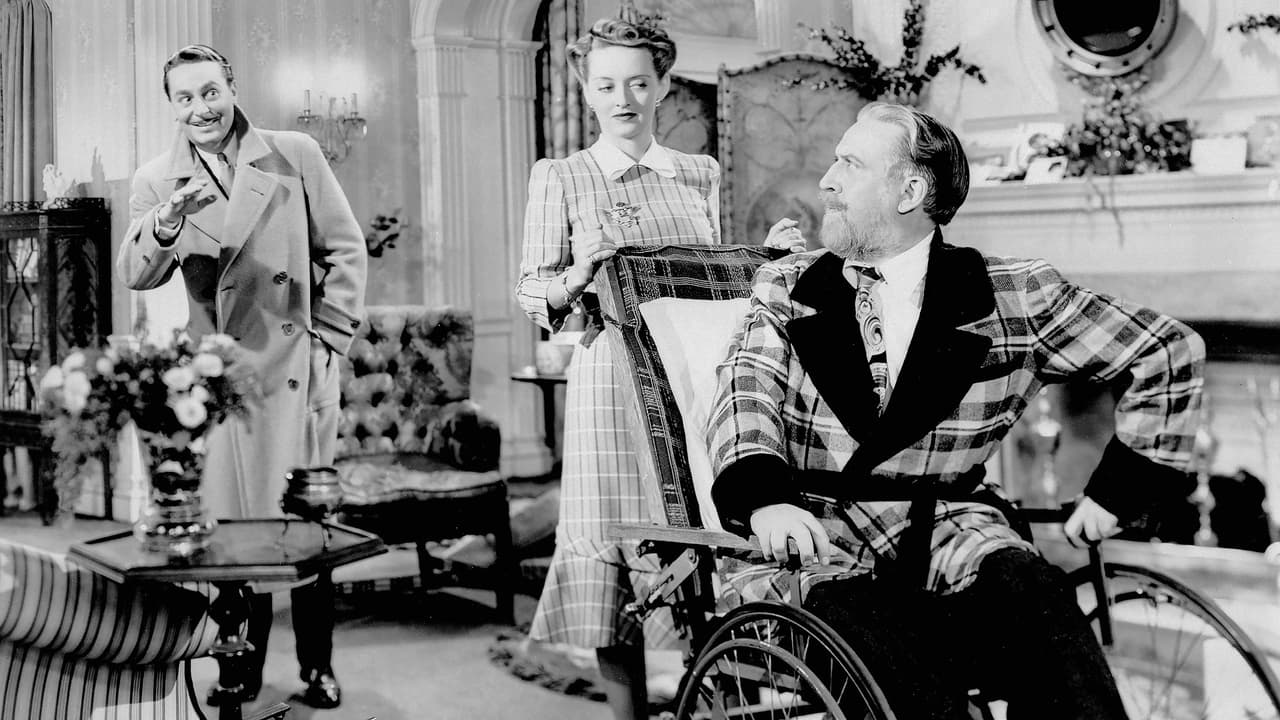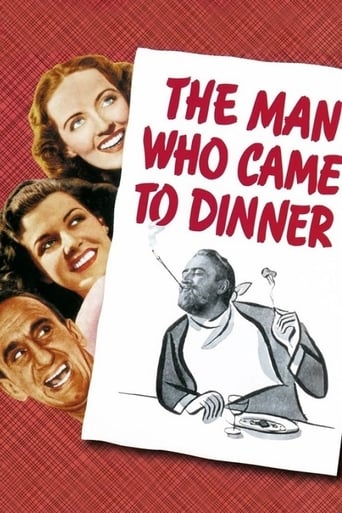

This film is worth watching for the very sharp and witty dialogue. It is still very funny and entertaining. Some of the best lines are towards the end, like Jimmy Durante hoisting up shocked nurse Mary Wickes in his arms and saying, "Meet me in my room in a half an hour with a loaf of rye bread!" Bette Davis does a decent job with a role that doesn't suit her very well, and she seems a bit melancholy, perhaps because the script requires her to play a cruel trick on an unsuspecting person. It doesn't seem like something her character would do, and the playwrights should have found another way to make the plot device happen. But don't let that spoil the fun, this is a light-hearted romp and should be enjoyed as such. Monty Woolley is perfect as Sheridan Whiteside, roaring like a lion and enjoying himself immensely in the role.
... View MoreI will admit that I was disappointed with "The Man Who Came to Dinner". I was expecting the humour to be a little dated, with lots of the hammy delivery, 'double-takes', and 'slow burns' that were a staple of comedies of that era, but I was also expecting the witty and sparkling dialogue that characterises the best of the genre (1934's "The Thin Man" being a good example). While Sheridan Whiteside (Monty Woolley) had lots of acerbic one-liners, most of the other characters simply served as targets, so there was not much of the 'give and take' repartee that can really liven up this kind of stagy story. Not surprisingly, Jimmy Durante 'over-the-topped' his manic 'Banjo' role while, on the other hand, Bette Davis was moderately restrained, playing a role than any Hollywood ingénue could have handled. The rest of the ensemble cast was fine, especially Anne Sheridan as a sultry parvenu from Kansas, character actress Mary Wickes as Nurse Preen, and Reginald Gardiner as Beverly Carlton (whose 'upper class twit of the year' impression was a highlight (IMO)). The broad-comedy bits (e.g. the arrival of penguins, octopi, etc. at the Stanley's besieged home) just seemed contrived and ridiculous and did a lot to lower my overall opinion of the film. All in all, I was underwhelmed but comedy is a very personal taste, so take my comments as opinion, not recommendation. Note: the script name-drops a 1940's 'who's who', so some viewers may want access to Google while watching (Zazu Pitts or Walt Winchell jokes being bit obscure these days), but I doubt that I'd want to watch an updated remake (on stage or film) – a phone call from Eleanor Roosevelt seems inherently funnier than a phone call from Melania Trump.
... View MoreLet's face it, if viewers are not at least acquainted in some way with the socio-historical context that inspired Hart and Kaufman's classic play (and William Keighley's film), they are going to find it slightly difficult to understand.If we are not aware that Sheridan Whiteside (Monty Woolley) is an affectionate parody of Alexander Woollcott, at the time a national celebrity due to his radio program, then we will not really understand just what a monster he actually is; the former doyen of the Algonquin Round Table group who took malicious pleasure in insulting everyone just for the sake of it. George S. Kaufman, another member of that Round Table, uses Whiteside both to criticize yet celebrate Woolcott's monstrosity.Likewise we need to understand how Reginald Gardiner's Beverley Carlton is a parody of Noel Coward: another member of the Round Table, he had become a star on both sides of the Atlantic, as well as the epitome of the rather effete English upper class twit. Gardiner is asked to play that role in Keighley's film, and very funny he is too.Banjo (Jimmy Durante) was apparently baaed on Harpo Marx: not much of Harpo's qualities emerge in Durante's performance, but instead we see Schnozzle emoting at all throttle, having the chance to jingle away at the piano keys as well as providing one of the main means by which the complicated plot can be wrapped up.There is a story of sorts, but in truth Keighley's film is something of a showcase for the talents of actors performing against type. Bette davis's Maggie Cutler is strangely muted, as she tries and mostly succeeds to put up with Sheridan's whims, while the grande dame role (that Davis customarily played) is here given to Ann Sheridan. Sheridan grasps the opportunity with both hands, offering a series of stylized cameo performances - appropriate to her belief in herself as a "great actress" - reminiscent of Margo Channing in ALL ABOUT EYE (1950).Apparently Davis was not entirely satisfied with the casting of Woolley in the central role. Yet perhaps that latent antagonism helped the film rather than hindered it - although professing enduring respect for the celebrity, Maggie holds his whims in infinite contempt. As a former Yale University academic, Woolley approaches the role of Whiteside with the same kind of bravura energy that he might have done had he been lecturing first year undergrads. He is so firmly convinced of his own rightness that he remains utterly imperious to anyone else's feelings.THE MAN WHO CAME TO DINNER might be a period-piece, but is nonetheless a very funny one.
... View MoreIn Mesalia, Ohio, the president of the local women's club Mrs. Ernest Stanley (Billie Burke) is the wife of the prominent ball bearings manufacturer Mr. Ernest Stanley (Grant Mitchell) and she is in rapture since the famous lecturer and critic Sheridan Whiteside (Monty Wooley) will have dinner with her family.When Whiteside arrives with his secretary Maggie Cutler (Bette Davis) at Stanley's home, he slip on the ice on the stairway n the front door, he breaks his hip and the diagnosis of the local Dr. Bradley (George Barbier) requires that Whiteside shall stay in a wheelchair confined in the house. The egocentric, selfish and despicable Whiteside demands the control of the entire house and tells that he will sue Mr. Ernest Stanley in an exorbitant amount.While the family lives hell on earth in their own home, Maggie falls in love with the owner of the local newspaper Bert Jefferson (Richard Travis) and quits her position. However, the abusive Whiteside invites the vamp actress Lorraine Sheldon (Ann Sheridan) to meet Bert expecting that she seduces him and Maggie stays with him.I had the greatest expectations with "The Man Who Came to Dinner" based on the name of my favorite actress ever Bette Davis and the IMDb Rating of 7.6. Unfortunately I found this film dated and unfunny, and even overrated. I did not find the abusive behavior of Sheridan Whiteside funny in any moment and his deplorable attitudes are actually nasty. The fool Mrs. Ernest Stanley may deserve part of the cruelties for her silly behavior but anyway I did not laugh while watching this comedy. My vote is five.Title (Brazil): "Satã Jantou Lá em Casa" ("Satan Had Dinner at Home")
... View More